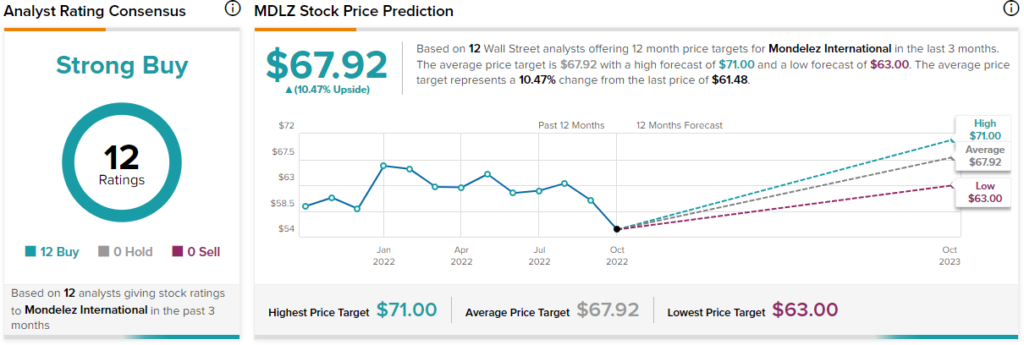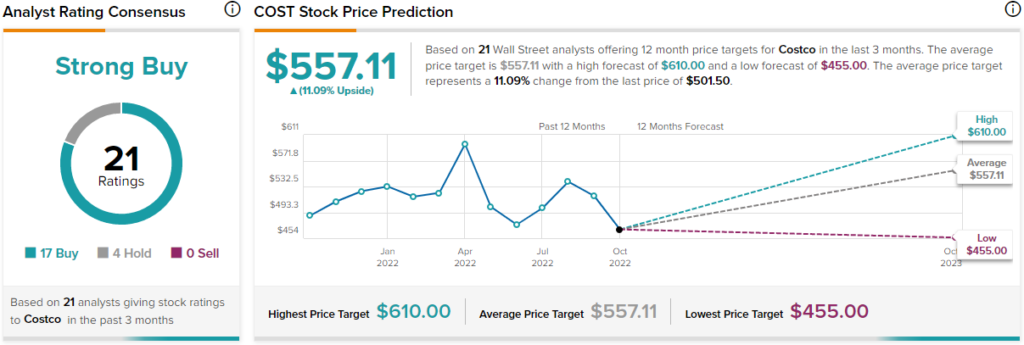With the gloomy macroeconomic clouds beginning to close in this earnings season, the recession now feels closer than ever. For new investors, it’s not fun out there, with only a handful of stocks in the green year-to-date. Though it’s never easy to put money to work in a bear market, there are tremendous rewards to be had by playing the role of a contrarian. In this piece, we’ll use TipRanks’ Comparison tool the get a better gauge of three recession-resilient stocks, MDLZ, COST, and WMT, to see where Wall Street stands ahead of a potential recession year. Each stock has a “Strong Buy” consensus rating from analysts.

Mondelez (NASDAQ: MDLZ)
Mondelez is a confectionary-focused consumer-packaged goods (CPG) company that’s down just 7.3% year-to-date. The stock sports a juicy 2.5% dividend yield and a low 0.64 beta. With a wide economic moat surrounding its well-known brand names (think Cadbury, Oreo, Toblerone, Trident, and Halls), Mondelez is a sleep-easy type of dividend stock for any portfolio.
At 22.4x trailing earnings and 2.7x sales, the stock seems fairly valued at best, given both multiples are pretty much in line with the food processing industry averages.
Over the past year, Mondelez has grappled with inflation woes, currency headwinds, and disruptions to the supply chain. These three sore spots have been common for most firms out there. Still, Mondelez has done a relatively decent job of weathering the passing storm.
Looking ahead, Mondelez is looking to grow revenues in the 3%-5% range, all while management looks to trim away at costs while streamlining operations. Indeed, such efforts to improve operational efficiency could help Mondelez bolster its profitability. Management has noted that it wishes to reinvest any saved costs in the business.
Undoubtedly, the candy and cookie business hasn’t changed much in the last few decades. Regardless, investments to bring new products could help add to Mondelez’s already sizeable economic moat.
As recession storm clouds loom, I’d look for comfort food demand to remain stable. If anything, the consumer appetite for sugary, low-cost “feel good” foods should increase as times get tougher. In that regard, Mondelez seems like a solid rock that can help keep your portfolio grounded as economic factors weigh on the results of most other firms.
What is the Price Target for MDLZ Stock?
Wall Street is incredibly bullish on the confectionary kingpin, with a Strong Buy and 13 unanimous Buy recommendations. The average MDLZ stock price target of $68.62 implies a 10.5% return over the next year.

Costco Wholesale (NASDAQ: COST)
Costco is a big-box retailer that’s becoming the envy of the industry. With some of the biggest and best deals in town, Costco has been one of the few beneficiaries of the past few years of high inflation. Indeed, consumers have been scrambling to save money on groceries, and Costco has been a haven for the increasingly cost-conscious consumer.
While Costco provides incredible value for its shoppers, it’s still not immune to the forces of inflation. Its goods have had to be marked up. For consumers willing to reach for private-label goods (Kirkland Signature is pretty much a gold standard as far as private labels are concerned), the daunting task of minimizing inflation’s blow has been made a bit easier.
As inflation persists and the world slips into recession, expect consumers to continue gravitating towards Kirkland versus pricier “branded” alternatives. In that regard, Mondelez and its established portfolio of packaged goods may risk losing market share to the generics.
Indeed, the rise of the private label started well before inflation struck. Ongoing inflation only helped it gain more ground over brands. While strong brands (like Oreo) will always have a competitive advantage, I think the magnitude of such advantages has been tested amid the inflation surge.
Costco membership renewals in Canada and the U.S. are high, at around 90%. As a recession approaches, while inflation stays hot, membership retention rates should improve further, and store traffic could easily keep climbing from here.
At 38.9x trailing earnings, Costco stock isn’t cheap. Given its strength going into a recession year, though, I’d not be afraid of paying up such a multiple for such a well-run company.
What is the Price Target for COST Stock?
Wall Street remains bullish on Costco stock, with a Strong Buy rating. The average COST stock price target of $557.11 entails an 11.1% year-ahead gain.

Walmart (NYSE: WMT)
Walmart is another grocery-heavy retailer that’s stood its ground well amid inflation, thanks to a private label that promises consumers Great Value (pun intended). In recent years, the company has looked to bolster its digital presence while touting its grocery delivery service.
Though Walmart still has a lot to do to catch up to other e-commerce behemoths, an inflation-plagued recession could slightly turn the tides in Walmart’s favor.
Walmart+, the company’s subscription-based offering, has helped loyal shoppers gain the perfect mix of convenience and cost savings. The subscription service is likely still in its early innings. As more consumers discover the value of such offerings, I do think Walmart could find itself clashing with warehouse clubs like Costco.
At the end of the day, Walmart and Costco offer unmatched savings. Bulk buyers may prefer Costco over Walmart for added savings. Still, it comes down to which retailer is closer to a given consumer. In that regard, both retailers are well-equipped to continue thriving at the expense of their smaller peers.
What is the Price Target for WMT Stock?
Wall Street loves Walmart, with a Strong Buy rating based on 22 Buys and four Holds assigned in the past three months. The average WMT stock price target of $153.60 implies a very modest 7.9% upside potential over the year ahead.

Conclusion: Wall Street Expects the Most Gains from COST
Undoubtedly, consumer staples and grocery-heavy retailers have historically been among the best places to shelter from broader market volatility. Between the three names, Wall Street expects the most returns from Costco.
















